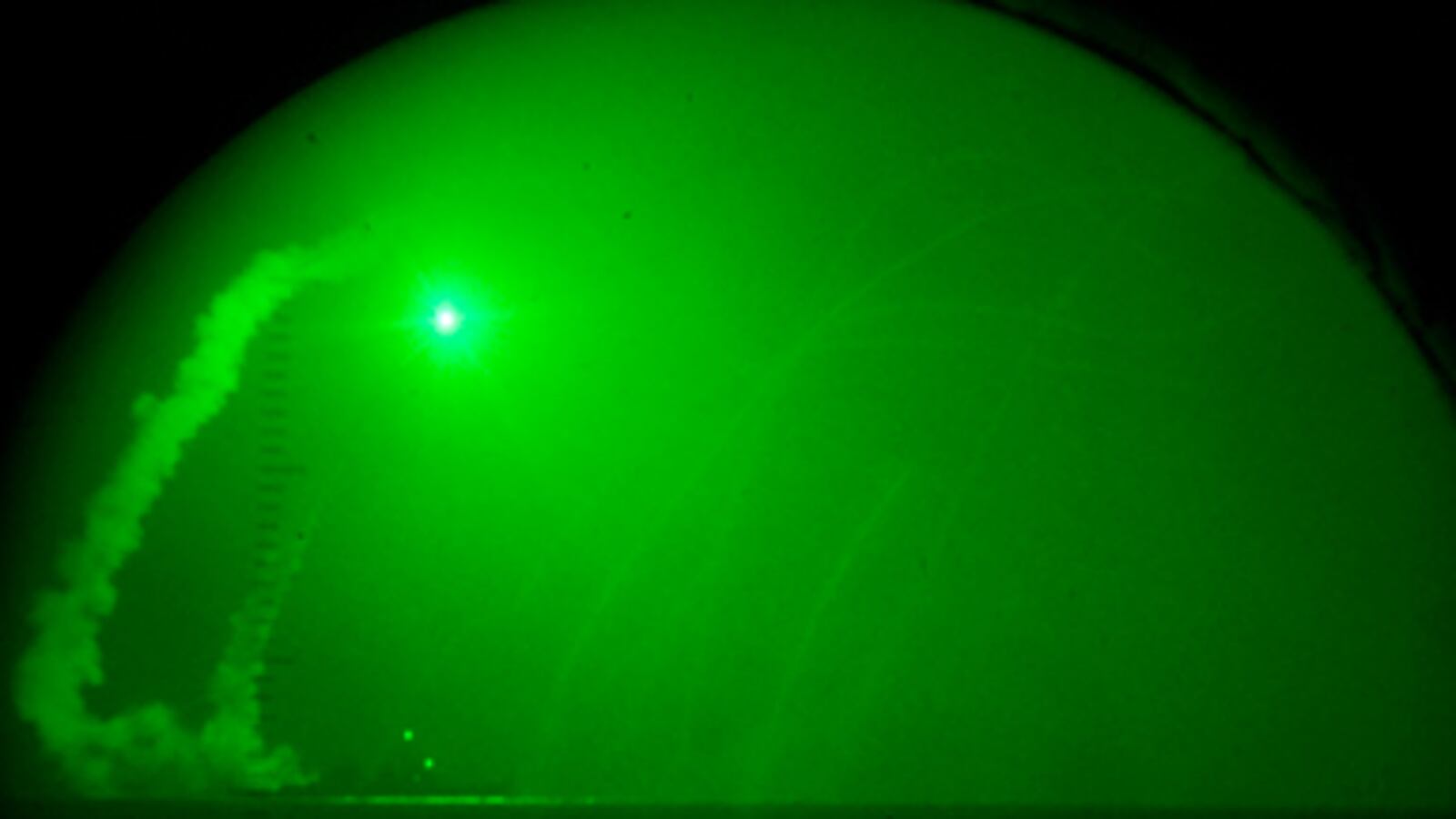Of all the things to hear crackle over an intercom, " Odyssey Dawn" probably isn't the one most likely to get your adrenaline pumping. At Vanity Fair, James Walcott says the name of the Libyan military operation reminds him of a 1970s porn star. Tom Watson, a ship in the Carnival cruise fleet.
To be fair, military operations aren't always named to be daunting. Army regulations actually specify they not be, or at least that they not "Express a degree of hostility inconsistent with traditional American ideals or current foreign policy." Nor should the names offend "good taste" or "our allies or other Free World nations" or be "derogatory to a particular group, sect, or creed." They also have to be two words, and neither of them can be "exotic" or "trite," or commercial trademarks, or the word "operation." Add to these constraints the requirement that the name be somewhat inspiring, and finding a good name becomes surprisingly hard.

Operation Infinite Justice sounded like a catchy name for the war in Afghanistan until the Bush administration realized the divine connotations of the phrase would offend Muslims already angry about President Bush's "crusade" comment. They changed it to Enduring Freedom after two weeks.
Operation names haven't always had to please such a wide audience. In a short history of military-operation naming published in Parameters, Gregory Sieminski writes that when operation names started being used, by the Germans in World War I, they were code, meant to give away as little information about what they described as possible. At the same time, they were meant to inspire the troops. Religion, mythology, and history were plundered for nouns; hence, names like Archangel, St. George, Roland, Mars, Valkyrie.
This practice of opaque but inspirational naming continued through World War II. Hitler and Churchill were both mad for code names and sometimes weighed in on them. Sieminski writes that Hitler changed the name for his invasion of the Soviet Union to Barbarossa, after the 12th-century Roman emperor, rather than Fritz, after the strategist's son. Churchill changed the invasion of Normandy to Overlord, rather than Roundhammer, the nonsensical combination of the previously planned invasions Roundup and Sledgehammer.
“The ‘Odyssey’ is puzzling, though,” says Nunberg. “Unless they’re saying they’re going to be wandering around the Mediterranean.”
• Babak Dehghanpisheh: Details on U.S. Jet Crash in Libya• Daniel Stone: Is the Libya War Legal?• Full coverage of LibyaChurchill even wrote out some guidelines for good names. They should, he said, be neither boastful and overconfident nor despondent and hopeless. They should "not enable some widow or mother to say that her son was killed in an operation called 'Bunnyhug' or 'Ballyhoo.'" And they should not give away the nature of the operation. Like the Germans of WWI, Churchill liked proper nouns: "The heroes of antiquity, figures from Greek and Roman mythology, the constellations and stars, famous racehorses, names of British and American war heroes." The Americans, when they joined the war, more or less followed the British in their naming style. The U.S. military started making mission names public after World War II, but they were haphazard about choosing their audience—the troops, the American public, or the enemy. For the next 40 years, when operation names weren't deliberately meaningless, like Bastogne or Junction City, they tended to be undiplomatically bloodthirsty, like Killer or Ripper, which inspired the troops in the Korean War but soured negotiations with the Chinese. In 1975, Sieminski writes, they decided to automate the whole thing, assigning agencies two-letter sequences with which to begin their operation names and creating a computer program to help select and store them.
That all changed in 1989, when the system resulted in Operation Blue Spoon. "Do you want your grandchildren to say you were in Blue Spoon?" Sieminski recalls Gen. James Lindsay asking Lt. Gen. Thomas Kelly. He did not. Nor did President George H.W. Bush want to waste a branding opportunity for a controversial war on a name that sounded like a jazz cafe. Blue Spoon became Just Cause (which had its own problems: Why'd Bush invade Panama? Just 'Cause), and the modern era of mission naming began. By the next year, the administration expended considerable effort coming up with a moniker for the Gulf War, picking Peninsula Shield from a three-page list of names, then changing it to Crescent Shield, then Desert Shield, then finally Desert Storm, which worked so well it became synonymous with the entire war. Minor operations kept getting random names according to the two-letter code, but naming major operations became a way to brand a war.
Geoffrey Nunberg, a linguist at the University of California Berkeley School of Information, points out that the U.S. started using operation names to influence public opinion around the same time that cable news began playing a big role in public discourse. CNN used a similar technique when covering ongoing stories, coming up with a short, snappy phrase that tried to tell a story: Flashpoint Kosovo, War in the Gulf, The Search for Chandra Levy. "The modifier follows the noun. That's a military style of naming that the cable news people adopted," says Nunberg. "Both the military and cable news tried to give a name that described a master narrative, even if there wasn't one."
The perplexing thing about the Libya name, Odyssey Dawn, is that what sort of narrative it is supposed to convey is not clear. Numberg guesses that the vaguely positive connotations of "dawn" are meant to allay concerns about American involvement in the region. Tom Sepanski and Christian Turner of the naming and writing division of Landor Associates, a brand consulting firm, echo that thought, pointing out that "Dawn" sets a more uplifting tone than "Storm" in Desert Storm while staying within the same form. Dawn is upbeat yet unspecific, avoiding the potential irony Churchill warned of when an overconfidently named mission goes poorly. It's also not the first time the Obama administration has gone with "dawn": In February of last year, the administration renamed Operation Iraqi Freedom " Operation New Dawn."
"The 'Odyssey' is puzzling, though," says Nunberg. "Unless they're saying they're going to be wandering around the Mediterranean." The word does seem like an odd choice, recalling Odysseus' 10-year journey to return home after a 10-year war, a bit like a Freudian slip by someone wary of getting sucked into a quagmire. Something Churchill didn't mention: Cultural references are nice, but you have to be aware of the connotations.
"'Odyssey' probably wouldn't have made it past our shortlisting session," says Sepanski, referring to the period when they vet names for negative connotations. "It communicates that we're going to be there for a very long time." Turner says he "probably would have gone with something that didn't sound so much like opening a new war." But the indifference to the connotations of "Odyssey" also shows that the name is probably meant for internal use. "It fits into a convention, and they're used to this kind of language," says Sepanski. "They're trying to make something benign, positive, and hard to criticize, but it seems a little like an afterthought," says Turner.
Eric Elliott, spokesman for U.S. Africa Command, confirms that suspicion. Seeing Odyssey Dawn in the same light as Iraqi Freedom or Desert Storm is a mistake, he says. "People's reaction to the name is, 'What does this have to do with Libya?'" says Elliott. "They try to apply the Iraqi Freedom model, trying to find meaning in it, when actually there isn't any." It's a throwback to meaningless names determined by the two-letter system.
When the president first started considering intervention, U.S. Africa Command started planning, and they needed a name for the plan that wouldn't let on that it was about Libya, says Elliott. Africom had been assigned three two-letter ranges to choose from: JS through JZ, NS through NZ, and OA through OF. They'd used JS-JZ and NS-NZ recently, so they looked at some OA-OF words and picked Odyssey. Then, Elliott says, they chose a second "nice sounding word that has nothing to do with the first but goes well with it." The commander approved it, they checked the database to make sure it hadn't been used before, and sent it on to Washington, where it was vetted with the country teams—usually the embassies, Elliott says—to make sure it didn't translate to anything offensive.
Odyssey Dawn started as a sort of unclassified code name, so that during the planning stages people could talk openly about working on Odyssey Dawn without giving away the nature of the project, says Elliott. But instead of coming up with a catchy, ready-for-prime-time name like Desert Storm when the operation was approved, they stuck with Odyssey Dawn.
"A lot of people have called trying to find meaning in the name," says Elliott. "The bottom line is that it was designed so there is no meaning."
Josh Dzieza is an editorial assistant at The Daily Beast.




